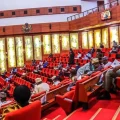
Education Minister Maruf Alausa addresses reporters during briefing on Epe University approval. Adebayo Adekunle/EPN
Presidential Approval for Epe University
The Ministry explained that President Bola Ahmed Tinubu granted approval for Epe University through an executive memo before the Federal Executive Council introduced a seven-year moratorium restricting the establishment of new universities.
The clarification followed public speculation regarding the timing of the approval relative to the council’s decision.
According to the Ministry, the Federal University of Science and Technology, Epe, was part of a group of three institutions authorized simultaneously by the President to enhance technological education across regions.
These include the Federal University of Science and Technology, Kachia in Kaduna State, and the Federal University of Environment and Technology located in Tai and Koroma, Ogoniland, Rivers State.
Epe University Approval and Legislative Delay
The Minister of Education, Dr. Maruf Olatunji Alausa, stated that the public announcement of Epe University came after the Senate resumed from its annual recess.
He noted that the National Assembly had been on break when the university establishment bill was initially ready for passage, causing a procedural delay before the document’s formal transmission to the President.
Dr. Alausa emphasized that the executive decision predated the moratorium and was consistent with the administration’s strategic approach to expanding access to science-based education.
Federal Government’s Moratorium Policy
The Education Minister reaffirmed that the seven-year moratorium remains in force across all federal tertiary education sectors.
He maintained that no new federal university, polytechnic, or college of education will be approved during the moratorium period, except those already authorized before the Federal Executive Council’s resolution.
The moratorium policy, adopted by the Council earlier in 2025, aims to consolidate resources and ensure sustainability in higher education management.
Context on Federal Higher Education Reforms
The moratorium followed the Federal Government’s review of the UNESCO education framework and domestic policy evaluations addressing duplication of federal institutions and funding constraints.
Dr. Alausa noted that the measure is part of a coordinated reform to strengthen existing universities, improve teaching quality, and expand research capacity.
He explained that Epe University’s establishment aligns with the government’s priority to promote science, technology, engineering, and innovation-driven learning within Nigeria’s educational blueprint.
Epe University and Regional Development
The Federal University of Science and Technology, Epe, is designed to support Lagos State’s industrial ecosystem and to foster collaborations with private and research sectors.
The Ministry described the new university as a key component of Nigeria’s long-term plan to diversify its economy through technological advancement.
It will focus on applied sciences, engineering, and innovation designed to stimulate economic opportunities for the South-West region and beyond.
Commitment to Transparent Implementation
The Education Ministry assured that the federal administration remains committed to transparency in implementing approved university projects.
It stated that the moratorium policy does not hinder earlier approvals and that all authorized projects will undergo due process to ensure efficiency and accountability.
The clarification by the Education Minister aims to dispel confusion over the overlap between presidential directives and council resolutions.
Previous Approvals and Council Decisions
Officials explained that the President’s executive memo authorizing Epe University was completed before the Federal Executive Council finalized its moratorium decision.
This distinction, they said, ensures that the establishment of Epe University remains lawful and fully compliant with executive authorization protocols.
The clarification reinforces the Federal Government’s stance that no retroactive measures would invalidate already approved educational projects.
Stakeholders Welcome Clarification
Education stakeholders across the country have welcomed the Ministry’s clarification, noting its importance in providing policy consistency and transparency.
Experts in education policy suggested that the clarification demonstrates the government’s intent to streamline university management while ensuring continuity of pre-approved institutions.
Observers added that the move may reassure development partners supporting science and technology programs in Nigeria.
Global Context of University Expansion
Internationally, countries like the United Kingdom and Australia have adopted temporary freezes on new university creation to consolidate existing resources and maintain educational standards.
Analysts say Nigeria’s moratorium follows this global trend of optimizing educational quality over institutional quantity.
The Ministry’s explanation aligns with similar governance models that prioritize long-term sustainability in tertiary education.
Official Reaffirmation of Moratorium Policy
Dr. Alausa reiterated that the seven-year moratorium remains “sacrosanct,” emphasizing that any deviation would contradict federal directives.
He said that the Federal Government will not consider or approve any additional federal tertiary institutions during the duration of the moratorium.
The Ministry’s position underscores the government’s goal to rationalize funding allocations and strengthen administrative efficiency within existing universities.
Presidential Oversight and Legislative Collaboration
The Education Ministry highlighted the ongoing collaboration between the executive branch and the National Assembly to ensure the legal formalization of pre-approved institutions such as Epe University.
The ministry affirmed that documentation and administrative processes are being finalized for the institution’s takeoff.
It added that the President remains actively informed about the progress of all education-related policies under the Ministry’s oversight.
Long-Term Vision for Education in Nigeria
The establishment of Epe University, officials said, represents part of a broader national effort to bridge the gap in technical manpower and advance Nigeria’s position in the global innovation economy.
The institution is expected to drive regional integration by collaborating with industry leaders in Lagos and neighboring states.
The Federal Government aims to position Nigeria’s science and technology universities as continental models for applied research and innovation.
In reaffirming its commitment, the Education Ministry underscored that the Epe University project remains a lawful product of presidential vision and not an exception to policy.
Conclusion
The Ministry’s statement reinforces that presidential authorization for Epe University preceded the moratorium’s enforcement and remains valid under existing laws.
Related: Obi Blasts Widespread Vote Buying in Anambra Election, Calls for Reform
It also confirms the administration’s intent to maintain a balanced approach between educational expansion and institutional consolidation across the country.
The Ministry restated its determination to adhere strictly to the seven-year moratorium while ensuring that ongoing projects such as Epe University proceed transparently and efficiently.





